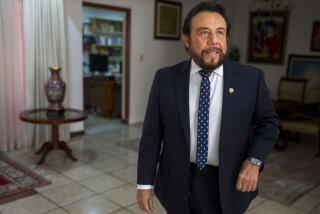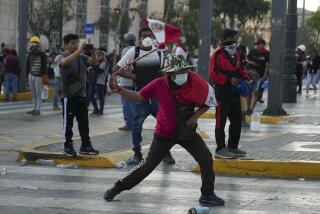Aquino Truce Bid Fails to Stop Rebels
- Share via
MANILA — Top military commanders told President Corazon Aquino on Wednesday that the nation’s Communist rebellion continues to claim civilian and military lives each day despite her three-week-old call for a nationwide cease-fire.
The apparent failure of Aquino’s peaceful efforts to put down a violent insurgency that analysts once considered a reaction to the harsh regime of former President Ferdinand E. Marcos was reported to Aquino and her 18-member Cabinet by the generals in a one-hour national security briefing after the new government’s second weekly Cabinet session.
Aquino’s press spokesman, Rene Saguisag, declined at a press conference to comment on the military briefing, which was classified secret. He would say only that the government’s approach to a rebellion that military authorities say has killed 144 civilians and soldiers since Aquino took office “is still sort of being played by ear.”
Several Cabinet ministers interviewed after the session, however, said the military’s message to the 53-year-old president was that there can be no solution to the protracted rebellion without some use of military force.
‘Alive and Active’
“We were told the insurgency is still very much alive and active in the country and that the government should recognize the need for some action,” said Aquilino Pimentel, Aquino’s minister for local government and a former activist against military abuses.
Throughout the campaign leading up to the Feb. 7 presidential election, Aquino pledged that, if elected, she would offer the rebels a six-month cease-fire during which her government would try to negotiate a settlement with the rebel leaders on the basis of amnesty in exchange for the laying down of arms.
Aquino has not met with any of the current rebel leaders since taking office Feb. 25 after Marcos fled amid a military and civilian rebellion. Nor has she announced a formal cease-fire.
The military under Aquino’s chief of staff, Gen. Fidel V. Ramos, has avoided the use of force against the rebels, but, in the wake of ambushes and massacres that have left dozens of soldiers dead in many of the nation’s islands, Ramos said in an interview Tuesday that the military is about to change its approach.
Troops Redeployed
Ramos has redeployed thousands of troops since Tuesday and ordered a new round of operations against known rebel strongholds on the islands where the worst of the attacks have taken place.
Cabinet sources said the general made it clear during his slide show and briefing Wednesday that the military will no longer take a passive role against an insurgency that grew rapidly in the face of corruption and abuse by soldiers in the Marcos regime.
During the interview Tuesday, Ramos also said he hopes the Aquino government will allocate more funds for his poorly equipped 200,000-man armed forces, adding that he also hopes to receive additional U.S. military assistance in the wake of Marcos’ downfall.
But during Wednesday’s Cabinet session, it was clear that the new government has even fewer resources than it had expected in its effort to get the country back on the road to economic and social recovery.
Budget Minister Alberto Romulo announced that the nation suffered a near-record budget deficit of 9.6 billion pesos ($430 million) just for the first quarter of this year--about double the anticipated deficit.
Urges Spending Cutbacks
Romulo blamed at least a third of the shortfall on massive withdrawals by the Marcos regime in January and February to finance his campaign for reelection. He added that every government ministry--including defense--will have to cut back on spending this year if the nation is to show signs of recovery from an economic slide that has left the Philippines more than $25 billion in debt.
Several of the Cabinet ministers said they hope that the government’s intensive drive to recover the hidden assets of Marcos and his family in the United States and elsewhere--an issue discussed during Wednesday’s session--will help ease the strain on the budget.
But Romulo said the country’s toughest period of “belt-tightening” will be in the next several months, and most of Marcos’ known assets, which may total billions of dollars, have become bogged down in litigation in U.S. courts.
Despite the large current deficit, though, Aquino announced after the Cabinet meeting that she is cutting the price of gasoline and other petroleum products by an average of 9%, which will mean that the government will take in millions of pesos less from oil taxes.
The cut was the only concrete measure to come out of the three-hour Cabinet meeting, in which government critics had hoped that Aquino would solve a growing political crisis by better defining her government.
Aquino has been under fire from former Marcos supporters and members of her own coalition to declare whether her government is “revolutionary” or whether she intends to work within the framework of the country’s 1973 constitution, which was drafted almost single-handedly by Marcos.
Courts Not Operating
None of the courts have operated since Aquino took office, nor has the 183-member National Assembly, the legislative body in which Marcos’ party had a two-thirds majority.
Aquino met late Wednesday with her justice minister, Neptali Gonzales, who is among the few ministers arguing for a revolutionary government, one in which Aquino could unilaterally dissolve the legislature and reappoint all of the nation’s judges. Critics charge that such a government would smack of the same dictatorial tendencies as Marcos’ regime.
More to Read
Sign up for Essential California
The most important California stories and recommendations in your inbox every morning.
You may occasionally receive promotional content from the Los Angeles Times.













